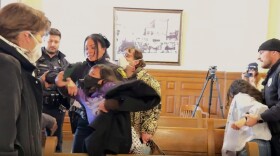This year Pride Month had a sense of urgency rather than celebration.
A year ago the United States Supreme Court issued its Dobbs opinion overturning Roe v Wade. In his concurring opinion, Justice Clarence Thomas wrote the court should reconsider other substantive due process cases and included Obergefell — which legalized same-sex marriage.
Common Councilor Jimmy Monto is the first openly LGBTQ+ official elected in the City of Syracuse.
"We have had a rough year as a community," Monto said. "We have had a pretty hard push from some people trying to push our community back into darkness or limit our rights or take away rights that have been granted to us — basic human rights. Every pride, I believe, is a call to action."
Major companies like Target and Bud Light saw attacks and threats to employees over Pride campaigns. Some states introduced legislation banning Drag performances.
Tavares Lewis, who performs as Drag Artist Miss Sparkle Royale, said this weighed on them as an entertainer.
"My job is to bring a safe space for people," Lewis said. "Be an entertainer for people to cry, laugh, love, or whatever it is in the moment of 5 minutes. It's sad that people can't enjoy that — the entertainer or the supporters."
Lewis hosted a drag event at Destiny USA earlier this year.
"I was very scared walking into a big public space like that," Lewis said. "Anyone could come in and go, 'We can shut this down.' Just because I am a drag queen and just because I'm also Black."
Just a few weeks before Pride, a former Destiny USA security guard threatened to shoot up the mall and the CNY Pride Parade. That employee was later charged with a misdemeanor charge of making a threat of mass harm and ordered to stay away from the Pride Parade and banned from Destiny USA property.
Monto said people tend to view New York as a very liberal state but said a kid coming out in a rural community in New York state is going to look different than a kid coming out in the middle of Manhattan.
"The fact of the matter is, the population of LGBTQIA+ people in those rural areas is lower," Monto said. "There's less visibility and there's less of a hive for those people to latch on to, less of a community for them to integrate into and gain support from."
That held true for Ariel Servadio. She said venturing out for the first time to queer spaces in Syracuse in her late 20s as a bisexual woman was discouraging.
"My first experience going to a queer bar, I was at a table of other cisgendered women who were queer, who were all talking about how they would never date a bisexual person," Servadio said. "I hadn't explicitly said that I was bisexual. But, it sent me this message of like, 'Oh, maybe I'm not gay enough to be here. Maybe my queerness isn't valid enough to be accepted by this group of people.'"
Servadio said she found community through Guerilla Gay Bar. Once a month the group descends on a traditionally non-queer bar or restaurant in the Syracuse area. Servardio, who is now an organizer for the group, said it also operates as a queer networking space noting some other queer venues are not always conducive to making meaningful friendships with new people because there is generally loud music for dancing or drag shows.
"Before I started attending I could count all of the queer people I knew in Syracuse on one hand and I didn't need all of my fingers," Servadio said.
Tanner Efinger is a founder of Guerilla Gay Bar and owner of Wunderbar — a queer bar in Downtown Syracuse. He notes while the atmosphere around Pride has changed this year, the Pride scene around central New York has grown in the past six years he's lived here.
"Our visibility in these small towns reminds the world that we are not just in big metropolitan areas," Efinger said. "We're in smaller cities. We're in towns. We're in rural areas. LGBTQ people are everywhere."
Efinger reiterated Monto's call to action, saying he believes no one should be able to say whether or not one group of people can have the same rights as others.
"When we have these piecemeal wins," said Efinger, "when we get the right to marry in this state or we are now allowed to donate blood, we need to hold on to those victories. But we also need to say it's not enough until we have everything — until we are fully protected under the law and we have the same rights and responsibilities as everyone else does. At that point, things will be different but right now we still have a lot of work to do."








